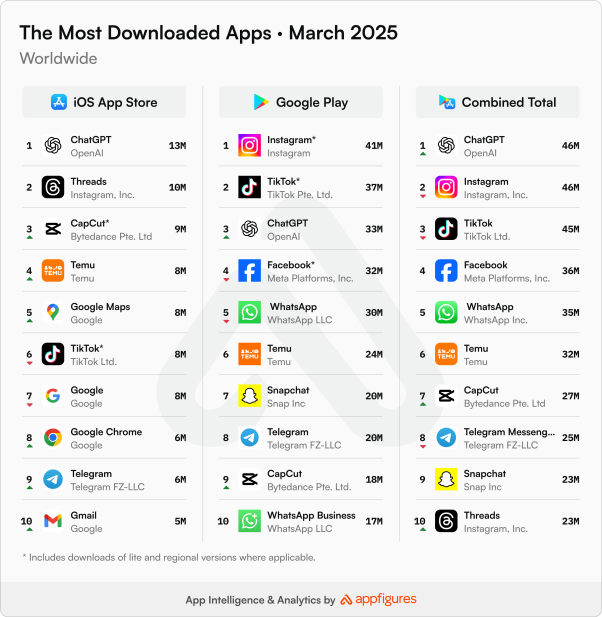In a historic milestone for artificial intelligence, OpenAI’s ChatGPT has officially become the most downloaded app in the world for March 2025—excluding games—overtaking long-standing leaders Instagram and TikTok. This marks the very first time ChatGPT has claimed the No. 1 spot on the global app charts and represents the app’s most successful month to date.
According to recent analytics from app intelligence platform Appfigures, ChatGPT’s mobile installs surged by a remarkable 28% compared to February, totaling 46 million new downloads during March alone. This growth pushed it just ahead of Instagram, which fell to second place, with TikTok following closely behind at third.

What Drove ChatGPT’s Explosive Growth?
Several key updates and features helped spark this surge in popularity. Most notably, March saw a major upgrade to ChatGPT’s image-generation capabilities—the first significant update to this feature in over a year. The improved image tools gave users the ability to create visually stunning and creative content, including viral Studio Ghibli–style images and memes inspired by classics like My Neighbor Totoro and Spirited Away. This sparked widespread social media buzz in late March and early April.
In addition to upgraded image generation, OpenAI also made enhancements to the app’s AI voice assistant and relaxed some of its earlier restrictions on content moderation for images. These updates made ChatGPT feel more responsive, expressive, and human-like—further solidifying its place as a go-to tool for creativity, productivity, and casual conversation.
A Cultural Shift: ChatGPT as a Verb?
But perhaps more significantly, experts believe that ChatGPT’s popularity has less to do with new features and more with its growing cultural relevance.
“It’s starting to feel like ChatGPT is becoming a verb, a lot like how Google did in the 2000s,” said Ariel Michaeli, founder and CEO of Appfigures. “To the point where many don’t just think ‘AI’—they think ‘ChatGPT.’ So when there’s a surge of excitement around AI, even about competitors like Grok, DeepSeek, or Manus AI, most people still turn to ChatGPT as their first stop.”
This kind of brand dominance is making it increasingly difficult for competitors to catch up. Even strong AI alternatives like Anthropic’s Claude haven’t matched ChatGPT’s download numbers. The only competitor showing signs of serious momentum is Grok, boosted by its association with Elon Musk and its integration with X (formerly Twitter), which gives it a strong platform for user adoption.
Social Media Giants Take a Back Seat
The surge in ChatGPT’s downloads has temporarily disrupted the usual dominance of social media apps on the global charts. In January and February of this year, Instagram consistently held the No. 2 spot, with TikTok remaining at No. 1—buoyed by a spike in downloads fueled by fear of a potential U.S. ban. Users rushed to install the app amid growing political scrutiny and an uncertain regulatory future.
That panic has since eased, as negotiations between U.S. officials and ByteDance, TikTok’s parent company based in China, continue. In the meantime, TikTok’s momentum has cooled slightly, allowing other apps like ChatGPT to seize the spotlight.
Instagram’s Resilient Popularity Among U.S. Teens
Despite losing the top global spot for March, Instagram remains a powerhouse in the U.S. and many other markets. A new survey by Piper Sandler found that Instagram is currently the most-used social media platform among U.S. teens, with 87% of respondents reporting monthly usage. TikTok follows at 79%, with Snapchat trailing at 72%.
Meta’s app portfolio continues to perform well overall. Alongside Instagram, both Facebook and WhatsApp landed in the top five most downloaded apps in March. Other apps that cracked the global top 10 included Telegram, CapCut, Snapchat, Meta’s Threads, and the popular shopping app Temu.
March by the Numbers
In total, the top 10 most downloaded non-gaming apps globally accumulated a staggering 339 million installs in March—up from 299 million in February. ChatGPT’s contribution to that growth underscores a broader trend: AI isn’t just a buzzword anymore—it’s becoming mainstream.
Whether it’s being used for creating content, solving problems, or just having fun conversations, ChatGPT is rapidly evolving into a digital utility—much like how Google became the default gateway to information decades ago.
As the AI arms race continues and consumer interest grows, one thing is clear: ChatGPT is no longer just an app. It’s a movement.










